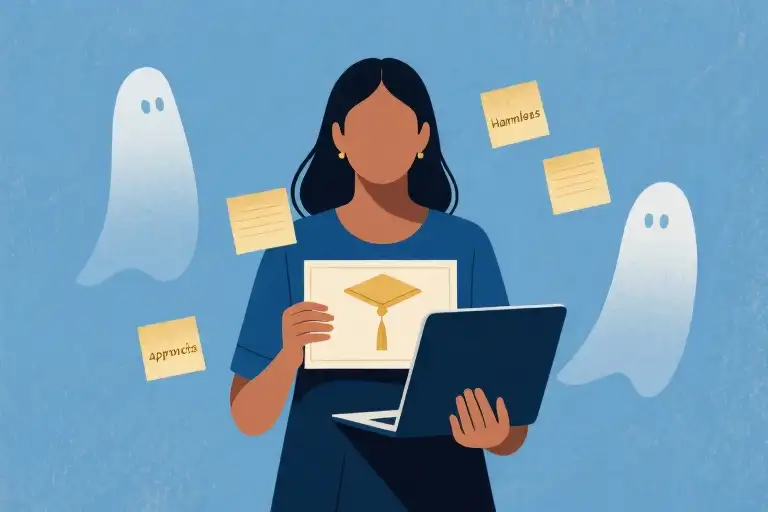This wasn’t something I learned from a book or an Instagram quote. It happened on an ordinary Tuesday afternoon at the local government office, between the hum of fluorescent lights and the smell of stale paperwork.
The woman standing ahead of me in the Aadhaar card queue carried exhaustion in her shoulders like a second skin—the kind that accumulates after years of being the designated rememberer of birthdays, bill due dates, and which drawer holds the school vaccination records. She was mid-call, walking someone through finding a specific utility bill at home, her voice fraying at the edges. When she asked the clerk for just one more minute, he tapped his pen against the ‘Next Counter’ sign without looking up. ‘Come back tomorrow,’ he said.
After hanging up, she turned toward the serpentine queue behind us. ‘No one else in my house knows how to do this,’ she muttered, pressing two fingers to her temple. ‘And I’m the one with a fever.’ The words hung there, sharp as the disinfectant scent in the air.
What stayed with me wasn’t just the systemic indifference—it was how she wore her competence like an invisible yoke. This wasn’t someone unaccustomed to getting sick; this was someone whose life had no margin for it. The type who’d automatically reach for a crying baby during a work call, who could recite her mother-in-law’s medication schedule faster than her own shoe size. The infrastructure of her family’s life lived in her muscle memory, and the system exploited that fluency without acknowledgment.
Outside, the monsoon heat pressed against the office windows. Inside, the ceiling fan chopped the air into uneven slices, doing nothing to disperse the unspoken truth: society runs on the unpaid labor of people who’ve internalized that showing up sick is still easier than training someone else to take their place.
The Invisible Laborers Our Systems Forget
Her fingers pressed into her temples like she was trying to physically hold something in – maybe the fever, maybe the frustration. That small gesture told more about invisible labor than any statistics ever could. In government offices and living rooms worldwide, this scene repeats daily: one person bearing institutional knowledge so essential it becomes invisible, until they’re too sick to stand.
Global data paints the pattern clearly. Women perform 76% of unpaid care work according to UN Women, that shadow economy of school forms and doctor appointments and knowing which drawer holds the insurance papers. The mental load manifests physically – in that tense shoulder posture, in fingers massaging temples under fluorescent lights. Systems assume someone will always remember, so no one designs for when that someone falls ill.
Public services operate on what I’ve come to call the ‘healthy person fallacy’. Procedures assume every citizen can:
- Return tomorrow if today doesn’t work
- Remember every required document
- Navigate bureaucracy without assistance
That woman at the Aadhaar counter exposed the flaw. Her fever shouldn’t have been the vulnerability point for her entire household’s access to essential services. When she whispered ‘No one else knows how,’ she wasn’t just describing her family – she was diagnosing systemic design failure.
The cruel irony? Those most burdened by invisible labor often appear most ‘functional’ to systems. Her ability to manage everything made her indispensable, until the day it made her invisible. Like human infrastructure, we notice these supports only when they crack under weight they were never meant to carry alone.
The Ripple Effects of Invisible Labor
That moment in the government office revealed something deeper than bureaucratic inefficiency. The woman clutching her phone while running a fever wasn’t just facing a system failure – she represented millions caught in a web of silent expectations. What begins as remembering passwords and bills creates psychological tremors that eventually shake entire social structures.
The Mental Load of Household Memory
Modern families operate on invisible infrastructure maintained predominantly by women. Remembering school schedules, medical appointments, and yes – where bills get filed – constitutes what psychologists call ‘cognitive labor.’ Unlike physical chores, this work has no clear start or finish. A 2021 University of Melbourne study found that 78% of primary caregivers experience ‘memory fatigue,’ constantly mentally cataloguing hundreds of household details.
The password phenomenon proves particularly telling. In most households, one person becomes the de facto IT department – remembering WiFi codes, Netflix logins, and banking credentials. This creates a paradoxical burden: the more competent you become at managing systems, the more systems expect you to manage. Like the woman at the Aadhaar counter, you’re not allowed system failures – even with a fever.
When One Person’s Absence Collapses Systems
Sociologists use the term ‘single point of failure’ to describe systems that crumble when one component fails. The government office scene illustrated this perfectly – a supposedly robust bureaucracy couldn’t accommodate one unwell citizen. Families operate similarly. When the ‘memory keeper’ gets sick, chaos often follows: missed payments, forgotten permissions slips, malfunctioning appliances nobody else knows how to operate.
This systemic fragility carries economic costs. Japan’s Cabinet Office estimates that preventable household disruptions cost their economy ¥2.3 trillion annually. When primary managers fall ill, workplaces lose productivity as others scramble to cover domestic knowledge gaps. Schools see increased late arrivals as alternate caregivers navigate unfamiliar morning routines.
The ‘Superwoman’ Myth We Can’t Afford
Cultural narratives exacerbate these issues. Advertising and media perpetuate the image of effortlessly multi-tasking mothers – the woman who bakes organic snacks while troubleshooting the router and filing taxes. This fantasy ignores cognitive science showing that task-switching reduces performance quality by up to 40% (American Psychological Association, 2022).
The most damaging consequence isn’t the extra work, but the expectation that it should feel easy. When the Aadhaar counter woman murmured about her fever, she wasn’t just stating a fact – she was breaking character. ‘Superwomen’ aren’t supposed to get sick, or forget things, or need help finding bills. The myth persists because admitting its falsehood would require restructuring everything from office hours to school pickup schedules.
These interconnected issues – the mental toll of household management, systemic dependence on invisible labor, and unrealistic cultural expectations – create self-perpetuating cycles. Solutions require addressing all three simultaneously, which we’ll explore next. But first, consider this: when systems assume someone will always remember, we all eventually forget how to share the load.
Rebuilding Balance: Practical Paths Forward
The woman at the Aadhaar office didn’t need abstract sympathy – she needed functional solutions. That moment laid bare how systemic failures become personal crises when we lack mechanisms to redistribute invisible labor. Here’s what actually helps.
Making the Invisible Visible
Start with a family responsibility audit. Not another mental checklist, but a physical spreadsheet tracking:
- Who currently handles bill payments
- Who remembers school vaccination schedules
- Who coordinates appliance repairs
Share access through cloud platforms like Google Sheets. Color-code by person – you’ll likely notice swaths of one color dominating. A client showed me her audit revealing she managed 87% of household ‘memory work,’ including remembering when to rotate mattress sides.
Crisis Protocols for Public Services
Government offices need laminated ‘Emergency Scenario’ guides at every counter. Simple flowcharts could address:
- If citizen appears visibly ill → Escort to priority queue
- If documents incomplete → Print pre-filled reapplication form
- If system outage → Activate paper token system
Stockholm’s tax agency trains staff to identify distressed users through micro-expressions. Their service manual includes a whole chapter on ‘Assisting the Overwhelmed’ – because they recognize that administrative systems shouldn’t require superheroic effort to navigate.
The Nordic Contrast
Compare two approaches to a sick parent needing documents:
Delhi Municipal Office:
- Requires physical presence
- No illness accommodations
- Zero tolerance for missing papers
Copenhagen Citizen Service:
- Accepts authorized proxies
- Provides home visits for €25 fee
- Allows 48-hour grace period for supplementary documents
The difference? One system expects perfect citizens, the other serves real humans. When Oslo implemented ‘Sick Day Service Guarantees,’ complaints about missed deadlines dropped 62%.
This isn’t about importing foreign models wholesale. It’s about challenging the assumption that remembering every password and deadline should fall to one person – or that being sick is some sort of personal failing in the face of bureaucracy. That woman’s fever didn’t create the problem; it revealed the brittle systems we’ve accepted as normal.
Perhaps real progress starts when we stop glorifying ‘powering through’ and start designing systems where basic services don’t require Herculean effort to access. Where no one has to whisper ‘But I’m the sick one’ to an indifferent government office.
The Drawer That Holds Everything Together
That image still lingers—the woman turning away from the government office counter, her shoulders slumping not just from fever but from the weight of being the only one who knew which drawer held the bills. It wasn’t just about paperwork that day. That moment crystallized something fundamental about how modern life functions: our systems quietly assume there will always be someone remembering, organizing, holding things together.
Most homes have that drawer (or folder, or notes app). The one containing:
- School permission slips no one else signed
- Insurance policies only you’ve read
- The wifi password written in your handwriting
- Vaccination records you tracked down during the pandemic
We treat these repositories of institutional memory as personal quirks when they’re actually social infrastructure. Like the woman at the Aadhaar office, millions perform this invisible labor daily—not just remembering information, but anticipating system failures before they happen. The mental checklist running parallel to every family emergency: Did I renew the health cards? Where’s the property tax receipt? What’s the Netflix password again?
Three things make this burden particularly corrosive:
- The presumption of availability – Systems design assumes someone will always be ‘on call’ to fill gaps
- The memory tax – Emotional labor compounds when you must remember that others forgot
- The penalty of competence – Being good at this work invites more assignments
That last point stings most. The woman with fever wasn’t suffering from lack of ability in her household—she was being punished for having too much. Like so many primary caregivers, her institutional knowledge had become both vital and invisible, noticed only in its absence.
Perhaps we need to start treating these domestic archives with the seriousness they deserve. Not as personal clutter but as:
- Family continuity plans (who knows the plumber’s number?)
- System redundancy measures (where are the digital backups?)
- Shared cognitive space (what happens if the ‘rememberer’ gets sick?)
The shift begins when we:
- Map the invisible – Make a household ‘institutional knowledge’ inventory
- Designate successors – Assign specific information stewards
- Build failsafes – Create password managers with emergency access
That government office scene could have unfolded differently. Imagine if:
- The system allowed temporary designees for essential tasks
- Her family had a shared responsibility map
- We valued memory work as real work
Your turn: Open that drawer. Photograph its contents. Share what you find with #InvisibleLabor—not as confession but as documentation of the quiet architecture holding daily life together.





